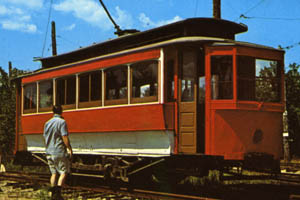
- Builder
- Metropolitan Railroad
- Description
- Converted horse car
- Secondary Use
- Railway maintenance
- Type
- City and Suburban Streetcars
- Year
- 1884
- Retired from Service
- 1967
- Acquired by the Museum
- 1967
- Fund
- 580
- Sponsor/Manager
- None
West End St. Ry. 724
From Boston, Massachusetts
History
The Metropolitan RR of Boston is the largest direct ancestor of today’s MBTA and built its own cars. Its Roxbury Crossing shop, though very small, turned out new horse cars on a weekly basis, and had enough excess capacity to build cars for the neighboring Cambridge RR. One of these products was the Met’s car 804, which was outshopped in 1884 or 1885. The Metropolitan was absorbed by the West End Street Ry. in 1887, along with three other local properties, making the West End the world’s largest horse railway. Metropolitan 804 became West End No. 724. The West End Street Railway began converting from horse car to electric operation in 1889. No. 724 was electrified and rebuilt from a 16 foot body to a 20 foot body in 1893, without being again renumbered. No. 724 was one of 131 former horse cars that the West End electrified and lengthened; these became known as “spliced cars.” No. 724 was painted vermillion with white trim and assigned to the South Boston Division.
No. 724 operated in passenger service until 1912, when it was converted into a wrecker. In 1935, it was repurposed as a rail grinding car, carrying grinding blocks between the wheels of its truck. No. 724 survived corporate reorganizations as the Boston Elevated Railway in 1897, the Metropolitan Transit Authority in 1947 and the Massachusetts Bay Transportation Authority in 1964. By 1967, No. 724 was believed to be the oldest trolley car owned by a public transit system in North America. Into the 1950s, No. 724 was used on the streets to grind track irregularities. Its final years were spent at Charlestown Yard where new but rusted rails would be set up, and No. 724 would run over the rails to grind off heavy rust accumulations.
No. 724 was still in maintenance service in 1967, when the museum approached the MBTA about its preservation. The result was not only 724’s preservation, but a long term agreement where the MBTA would provide cars and other vehicles for preservation for a nominal fee. In return, the museum would provide cars to the MBTA for historic and other purposes as required. This agreement provided for the MBTA to lease #724 to the museum for $1 per year. In 1975, the MBTA transferred ownership of the car to the museum. No. 724 has been partially restored, and careful removal of many layers of paint has exposed the lettering “South Boston” dating to its lengthening in 1893. No. 724 is the oldest known surviving Boston rail transit vehicle.
Technical Information
- Seats: 26
- Control: K-28
- Brakes: Hand
- Compressor: None
Trucks
- Number: 1
- Manufacturer: Brill
- Model: 21E
Motor
- Number: 2
- Manufacturer: General Electric
- Model: 86
Weight and Dimensions
- Length: 29’ 8.00"
- Width: 7’ 8.00"
- Height: 11’ 8.00"
- Weight: 19072 lbs.
© 1998 - 2026 New England Electric Railway Historical Society. All Rights Reserved.